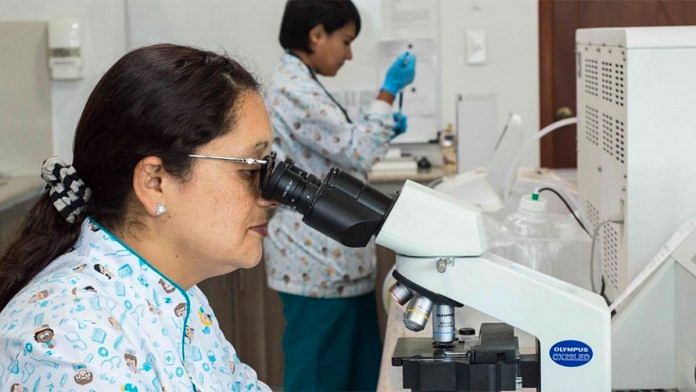New Delhi: An announcement by British pharmaceutical giant GSK to settle another lawsuit in California alleging its discontinued antacid Zantac caused cancer, has again brought the focus on ranitidine, the active ingredient in the drug, in India.
Launched in 1981 by GSK’s forerunner Glaxo, ranitidine is sold and consumed as a popular heartburn medicine under the names such as Rantac, Aciloc and Zinetac despite being banned or suspended in the US, Europe and Australia among others.
In 2019, scientific evidence emerged that ranitidine, used to treat peptic ulcer and gastroesophageal, reflux disease and heartburn and indigestion, deranged over time to form a probable carcinogen compound, NDMA or Nitrosodimethylamine. Many regulators banned it following an alert by the US Food and Drug Administration (FDA).
The next year, the FDA ordered a national withdrawal of all brands of this medicine, triggering a wave of lawsuits against several pharma firms, including Pfizer, Boehringer Ingelheim, Sanofi and GSK.
But in India, a scientific committee formed by the Central Drugs Standard Control Organisation (CDSCO) could not reach a conclusion on whether ranitidine’s sale should be discontinued, officials in the apex drug regulatory agency told ThePrint.
“The committee was formed three years back and held a few meetings but several studies discussed there showed conflicting evidence,” a senior CDSCO official told ThePrint. “As there was no sufficient or conclusive evidence to link ranitidine’s consumption with increased incidence of cancer, hence no decision has been taken so far.”
Another CDSCO official, too, said the matter was discussed several times by the experts but is “not under active consideration as of now”.
ThePrint contacted Drug Controller General of India Rajeev Singh Raghuvanshi, who heads the CDSCO, over phone but got no response. This report will be updated as and when a reply is received.
The Union health ministry, however, had dropped ranitidine from the 2022 National List of Essential Medicines, which includes drugs to treat diseases considered public health concerns, are procured for government health programmes and through which the government directly controls their ceiling prices.
A GSK spokesperson in India told ThePrint that it had globally recalled Zantac in 2019 itself and does not sell the medicine in India even though the medicine is allowed to be sold here.
Also Read: In a 1st, US heart association defines condition linking heart, kidney disease, diabetes & obesity
Alarm over NDMA
A volatile chemical belonging to the nitrosamine class of compounds, NDMA is a by-product of manufacturing processes involving alkylamines, which reaches air, water and soil.
Its exposure may take place through tobacco smoke and even food items, especially nitrite-preserved foods such as cured meats. It can also form in the stomach endogenously during digestion of alkylamine-containing foods (found in some plant products such as tea, wine or apples) at very low levels.
The WHO’s International Agency for Research on Cancer classifies NDMA as a possible carcinogen for humans.
A senior pharmacologist attached with the AIIMS-Delhi pointed out that NDMA is formed in ranitidine active pharmaceutical ingredient (API) because of an intermolecular degradation reaction between ranitidine molecules that occurs primarily in a solid state even though the exact reaction mechanism is unknown.
In 2019, after an alert by the USFDA, drug regulators in some countries concluded that the ranitidine molecule itself was capable of generating NDMA while some others linked it to API impurities, he said.
“Indian drug regulatory authority, however, is not fully convinced yet that the purported risk associated with NDMA in ranitidine is bigger than the benefit that the medicine has for heartburn patients.”
The pharmacologist further stressed that there is a need to define an acceptable safe limit for NDMA. “In healthcare and pharma, decisions have to be taken as per evolving scientific understanding. I think it’s important for the CDSCO to respond to the issue,” he added.
Evidence to the contrary, too
While ranitidine was under scrutiny for the last four years, not all evidence suggests so. Dr Rajeev Jayadevan, a gastroenterologist and medical researcher from Kerala, pointed out that it is a cheap and effective medication used for acid-related conditions for over four decades.
“Doctors all over the world have used this drug without concern in millions of patients. It is one of the few drugs that has minimal side effects in real life practice. It’s priced about Rs 1 per tablet, only one-third of the cost price of newer agents called PPIs or proton pump inhibitors,” he stressed.
While NDMA is classified as Group 2A carcinogen (probable carcinogen) among numerous agents, this doesn’t mean every person exposed to them will get cancer, he said.
For instance, Jayadevan said, diesel exhaust is classified as Group 1 carcinogen, which is the strongest cancer link possible. “(But) We know that not everyone exposed to diesel exhaust gets cancer in real life despite its high grading by the IARC,” he said, adding that multiple studies have shown no link between ranitidine and cancer.
One such study, carried out by researchers from various countries, involving 1,183, 999 individuals across multiple countries, published in Jama Network last month, showed no cancer risk with ranitidine use in clinical practice.
“While enhanced quality control measures in pharmaceutical products are important, what must also be taken into account is how clinically relevant such findings are, and how it will impact the cost of medical therapy in millions of people across the world,” Jayadevan said.
(Edited by Tony Rai)
Also Read: ICMR urges scientists to develop accurate typhoid test — ‘existing ones could spur drug resistance’



